Lifestyle
The Guardian reports that Slavoj Žižek and Miha Mazzini are among those writers less than impressed with Peter Handke winning the Nobel Prize for Literature, due to his support for Slobodan Milošević during the Balkan War, joining names such as Salman Rushdie and Hari Kunzru in their condemnation of the Austrian author, who has Slovenian roots on his maternal side.
Žižek, the “rock star philosopher” and most famous Slovenian cultural figure on the international scene told the British publication:
In 2014, Handke called for the Nobel to be abolished, saying it was a ‘false canonisation’ of literature. The fact that he got it now proves that he was right. This is Sweden today: an apologist of war crimes gets a Nobel prize while the country fully participated in the character assassination of the true hero of our times, Julian Assange. Our reaction should be: not the literature Nobel prize for Handke but the Nobel peace prize for Assange.
The story also quotes the Slovenian author Miha Mazzini as follows:
Some artists sold their human souls for ideologies (Hamsun and Nazism), some for hate (Celine and his rabid antisemitism), some for money and power (Kusturica) but the one that offended me the most was Handke with his naivety for the Milošević regime. And it’s personal. I will never forget the cold winter when Yugoslavia was falling apart and there was nothing on the shelves of the stores. We were a young family and my daughter was a toddler and it was bitterly cold. I’d spent the whole day in the queue for the heating oil and in the evening, almost frozen, I started reading Handke’s essay about Yugoslavia. He wrote of how he envied me: while those Austrians and Germans, those westerners, had fallen for consumerism, we, Yugoslavs, had to queue and fight for everything. Oh, how close to the nature we were! How less materialistic and more spiritualised we were! Even at the time, I found him cruel and totally self-absorbed in his naivety.
You can read the complete article here.
Related: 70 Quotes for Žižek’s 70th Birthday
On Wednesday, October 9, Ljubljana was awarded the Digitalisation Award in the European Capital of Smart Tourism 2020 at a gala event in Helsinki, held as part of the European Tourism Forum.
In addition to two overall winners, Gothenburg (Sweden) and Málaga (Spain), four cities have been recognised with 2020 European Smart Tourism Awards for their outstanding achievements in the four categories of the competition. These four cities received the highest scores in individual categories among all 35 applicant cities during a preselection phase, carried out by independent experts.
The 2020 European Smart Tourism Award in Accessibility went to Breda, Netherlands; the Award in Sustainability went to Gothenburg, Sweden; the Award in Cultural heritage and creativity went to Karlsruhe, Germany and the Award in Digitalization went to Ljubljana, Slovenia.
The jury was impressed by Ljubljana's various smart solutions including the official tourism website with its rich content and a series of apps - especially the tap water app for locating water fountains all around the city, and the Ljubljana by Wheelchair app.
The European Capital of Smart Tourism is an initiative launched by the European Commission to increase Europe’s profile as a tourist destination and establish a platform for the exchange of best tourism practices between European cities.
By being awarded the title, Ljubljana has received the confirmation that within a year it has succeeded in upgrading and improving the city for its citizens and also as a travel destination. Furthermore, it has once again become an inspiration to other tourist destinations across Europe.
For more on the award and the current city improvement plans, go to visitljubljana.com.
On Saturday, October 12, Open Kitchen will visit the coast for the last time this season. Stalls full of local and foreign delicacies will re-fill the picturesque Carpaccio Square and the friendly Tavern Shadow in Koper. The event, organized by the Open Kitchen team in cooperation with the Municipality of Koper, will start at 11am and last until 9pm.
To ensure that no one on the coast needs to cook at home this Saturday, a colorful selection of tastes and flavors will make sure that nobody goes home hungry or dissatisfied.
At the Turkish Yildiz Han booth, for example, visitors will choose between Turkish delicacies such as kebab on a saber, traditional Turkish burek, sarmas in vine leafs and baklava.
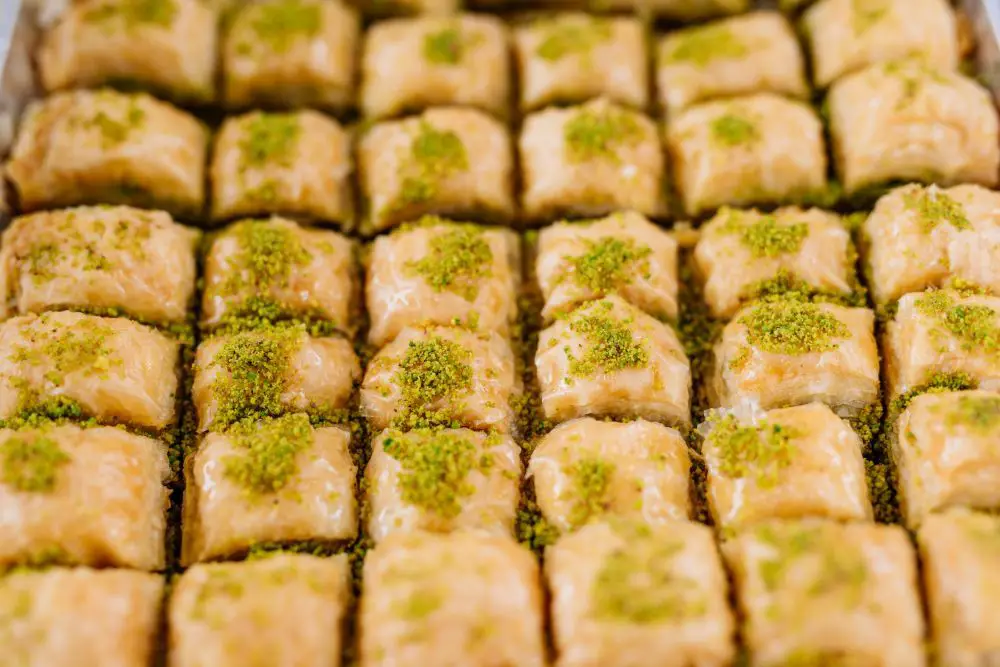
Thai Pink Elephant booth will serve Suki Yaki noodles which will come with a learning lesson on what different levels of “hot” actually mean. Namaste Indian Restaurant stand will offer meditation with chewing yoga practiced on delicious rumali roti rolls.
For those of sharp sense of aesthetics, a special workshop on how to make something really tasty and beautiful from the simplest things, such as hot dogs will be held by professors from the JEDU Wurst & Dogs team.
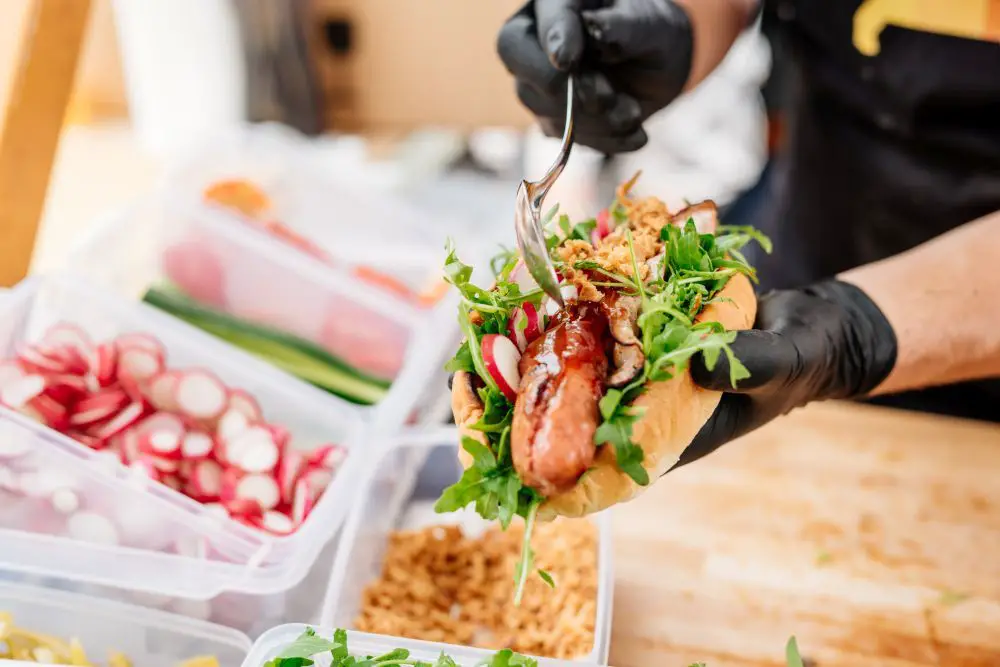
Visitors to Stari pisker pub and Guesthouse and Argentino Steakhouse stalls will learn about what a really good piece of meat is and how it should be prepared to get the best out of it.
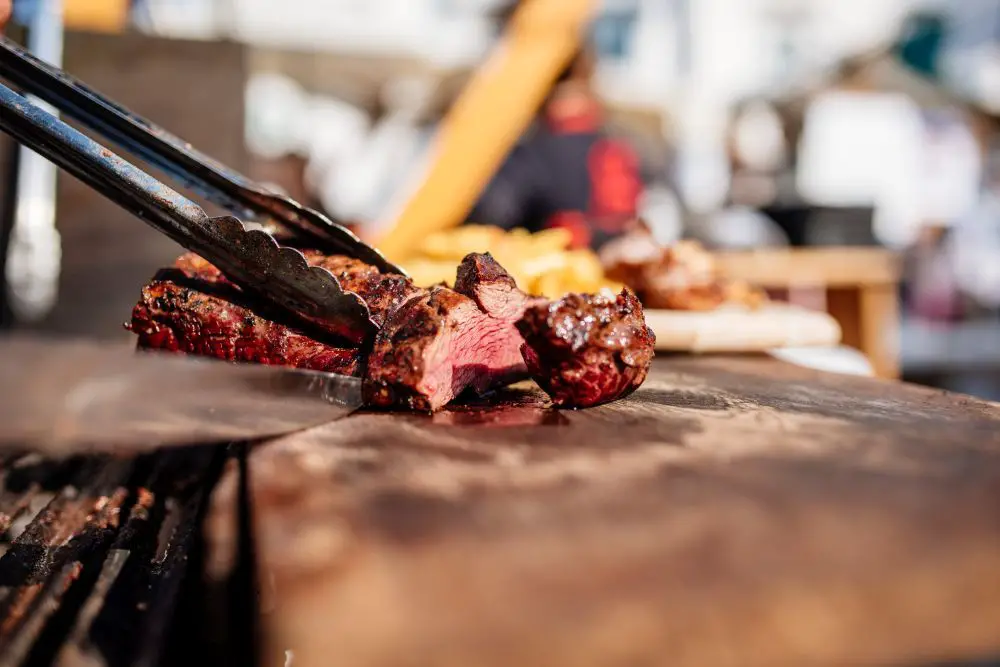
At the Land of Flavors (Dežela okusov) stall you’ll be able to learn how to eat like an Egyptian and the Chinese garden Restaurant will be stirring the legendary fried noodles.
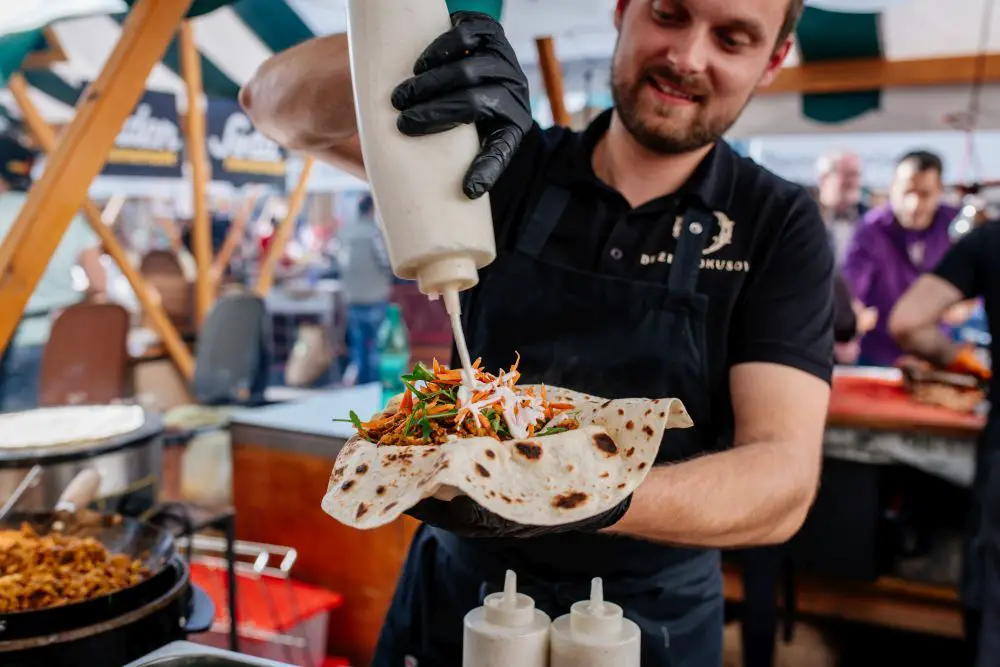
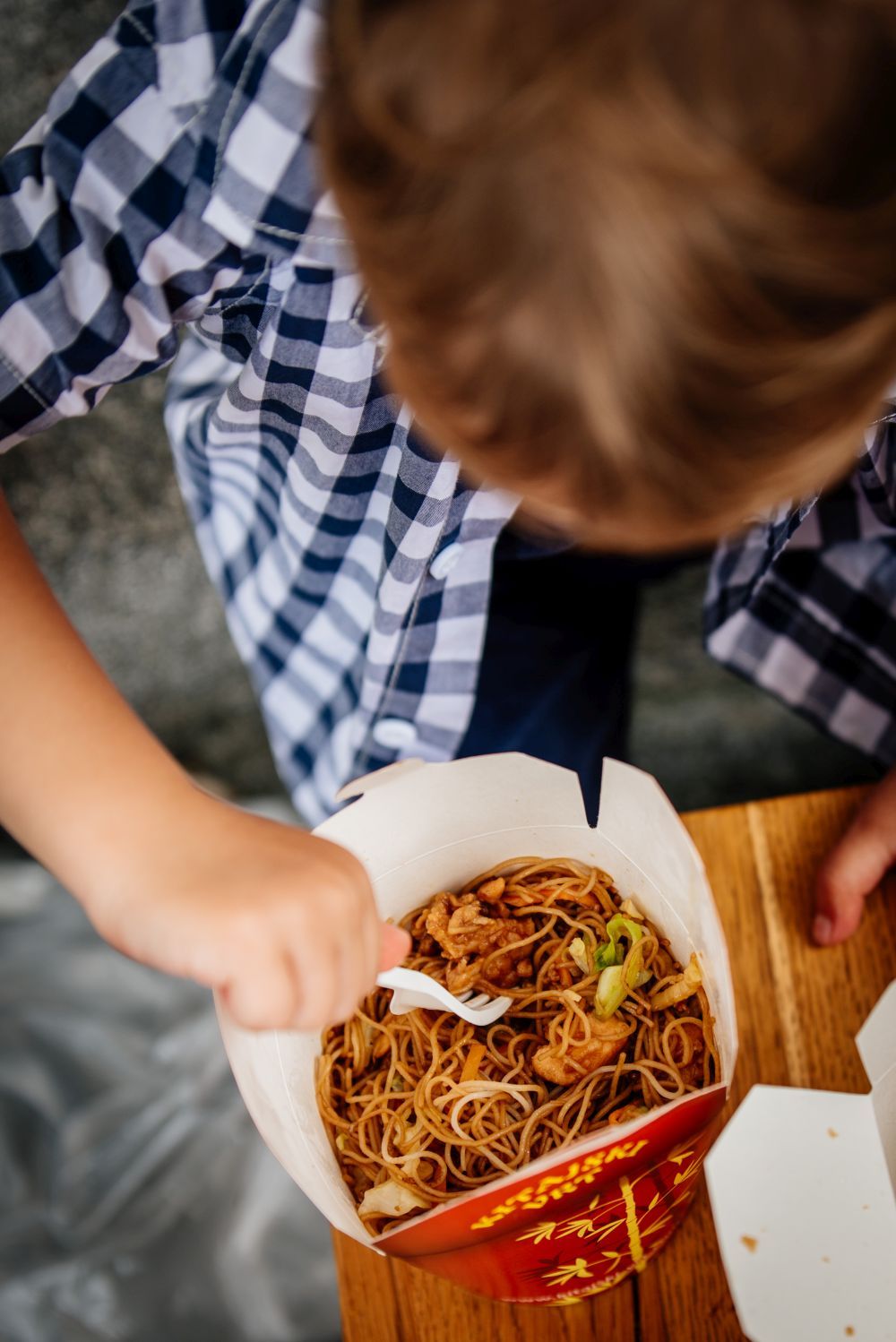
That mixing of culinary traditions leads to some very tasty results will be proven at the Super hrusta stall, where suckling will be roasted on a Chinese grill then served with sauerkraut and pan fried potatoes.
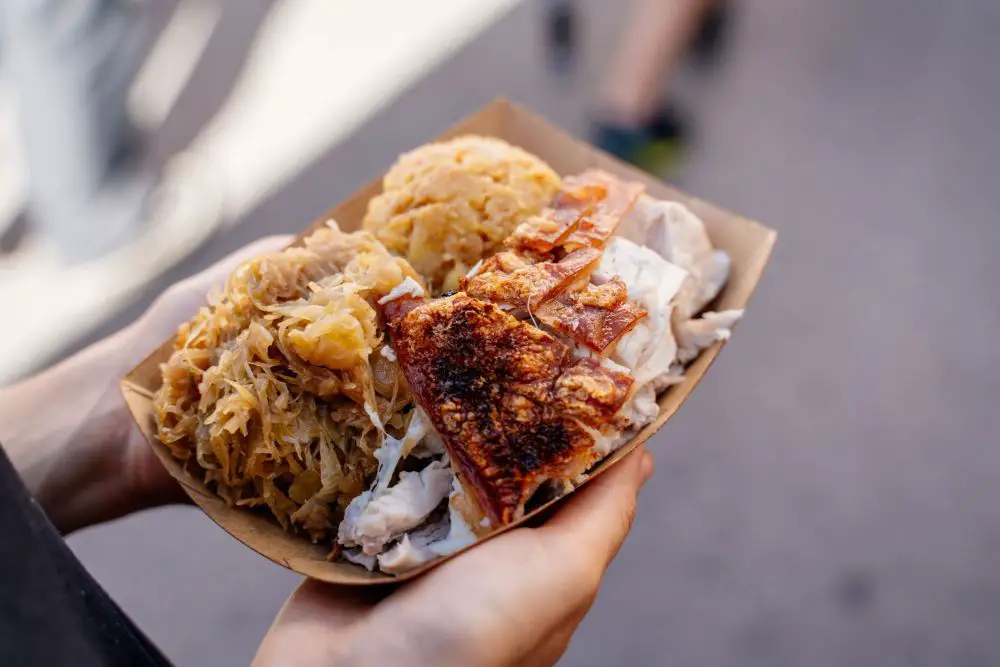
And for the end of the day, deserts will be served by TWISTER Ice Cream Rolls, Dvor jezeršek and Atelier Karim, and liquids mixed and poured by Experiment, J&B Winehouse and Craft beer.
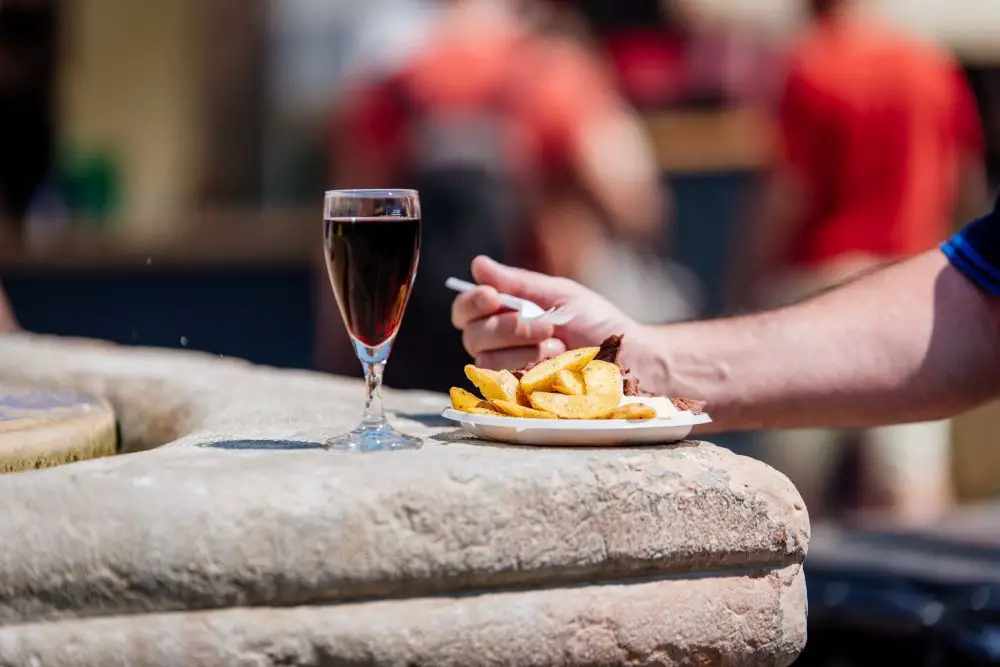
The world of Slovenian craft beer is a fast moving one, and to help you follow the latest developments we’re hoping this will be the first in a series on what’s new, put together with aid of Damir Galijaš, the multi-lingual, multi-talented man behind the Lajbah Pub (Grudnovo nabrežje 15, Ljubljana) and the Že V Redu, Primož beer store and tap room (44 Trubarjeva cesta, Ljubljana), both offering a huge, varied and evolving selection of the best local and imported craft beers.
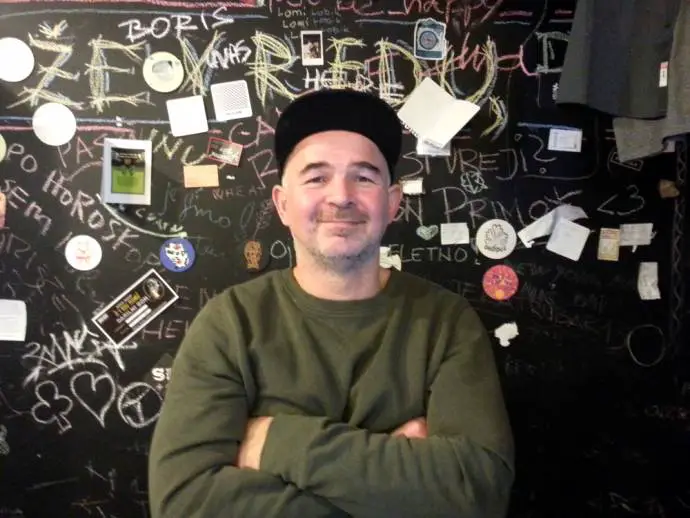
"When I go out I drink a pale ale, then an IPA, a sour, double IPA and finish with an imperial stout."
Here are four recent Slovenian craft beers, and one cider, that Damir has been enjoying, in the words of the man himself.
"Dr Orel is back. It was one of the first craft breweries in Slovenia, and it was totally focused on gluten free beer, which was good but ahead of its time. Now Hopsbrew (Domžale) have bought the licence and they’ve relaunched it, which I think is going to become more and more popular."
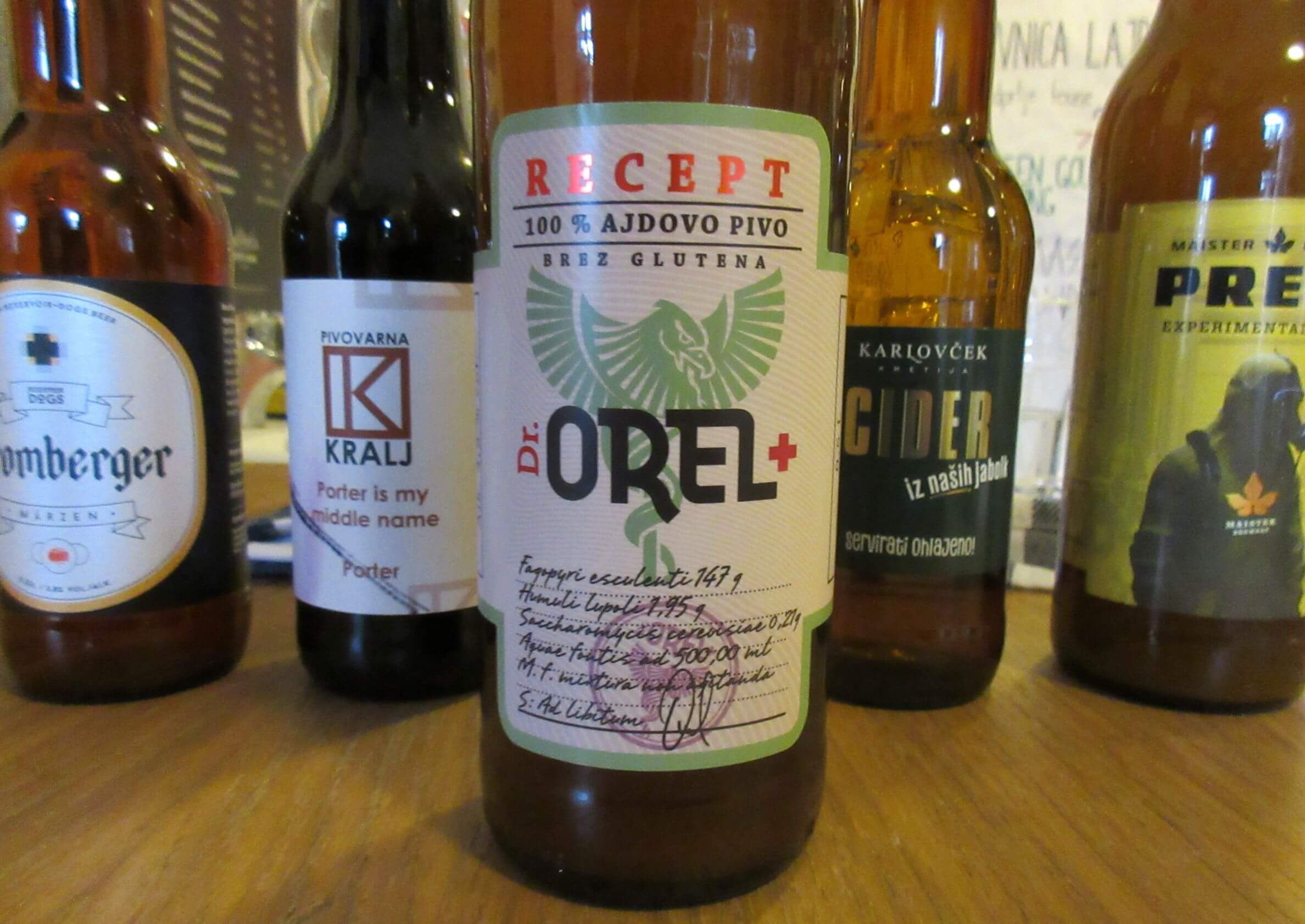
"This cider is from Karlovček, a small farm in Šentjernej with lots of apples, and so they started to make a craft cider. Of course it was very popular over the summer, but it’s gluten free and so on, so it’s something you can enjoy all the time."
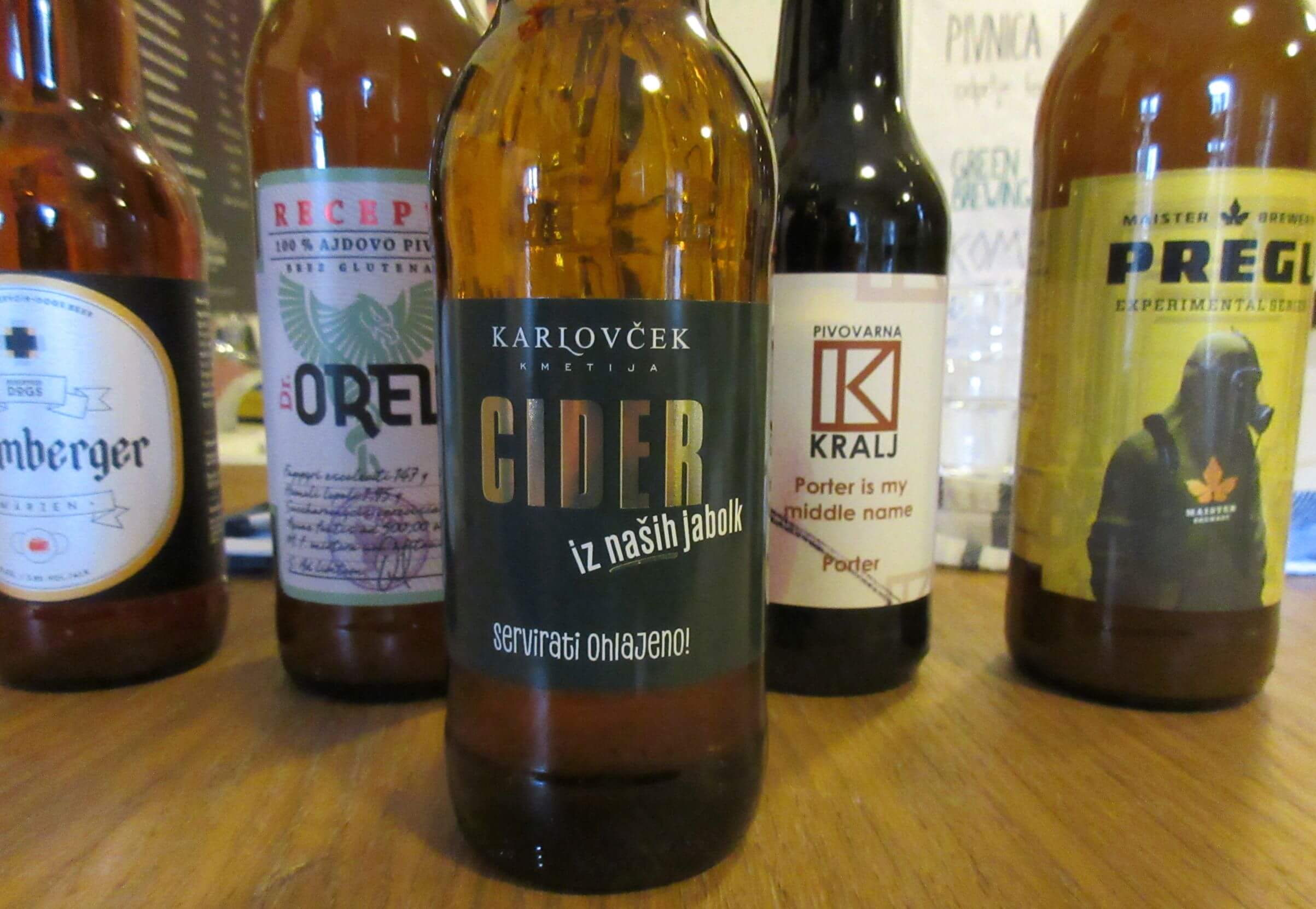
"This is a coffee porter from Pivovarna Kralj, a very small brewery with very nice beers, based on the outskirts of Ljubljana. They have an old farm that’s now a brewery. This porter is fantastic, which we also have on tap at Lajbah, with a very good price and performance. Going into autumn and winter the dark beers will be more popular, and this is a great one to sit on the couch in the evening and enjoy alone or with a friend."
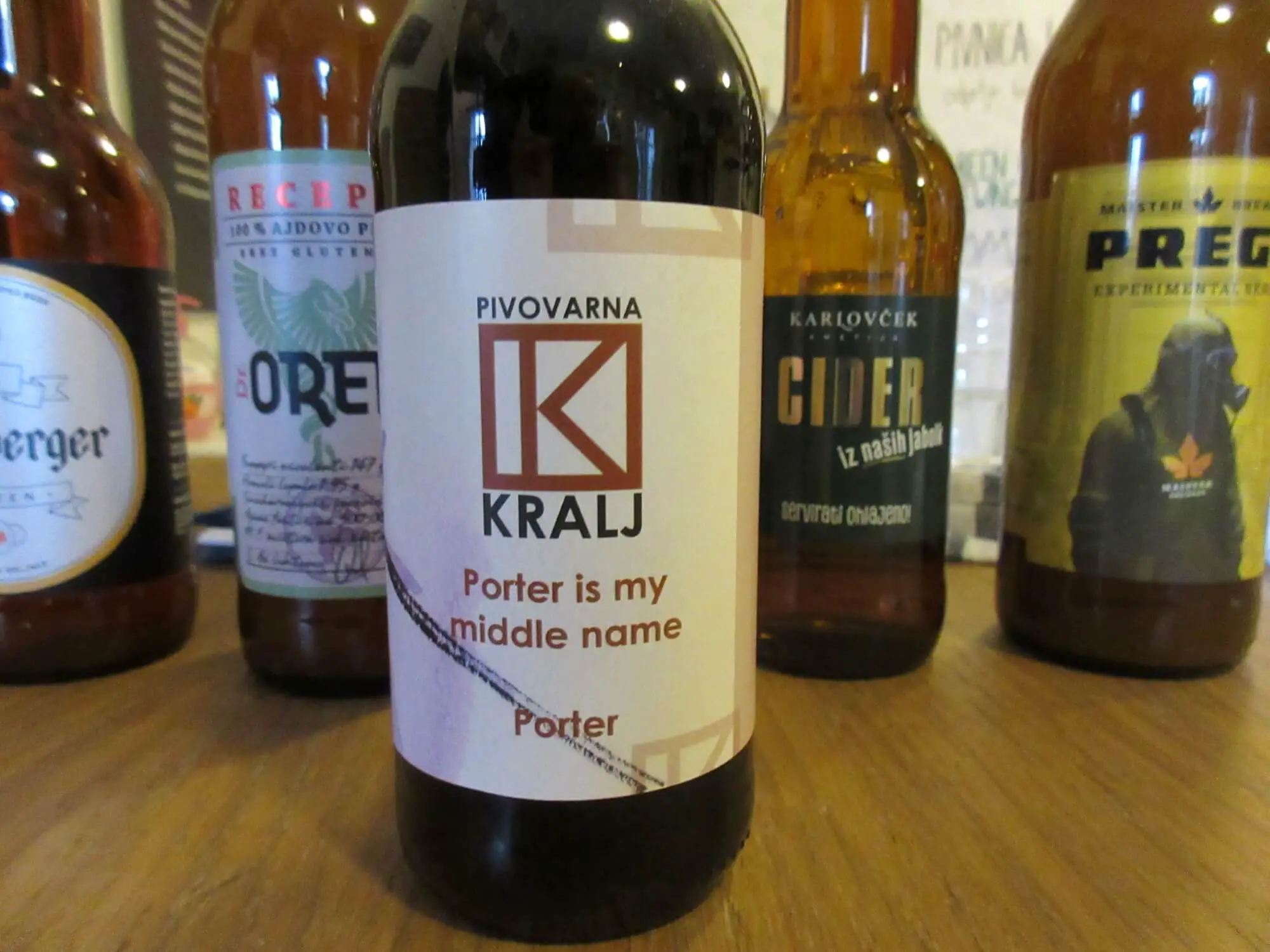
"This is the new Kromberger pilsner from Reservoir Dogs, in Nova Gorica. It’s a fresh beer, maybe just one month old, and a craft beer for people who don’t like craft beer."
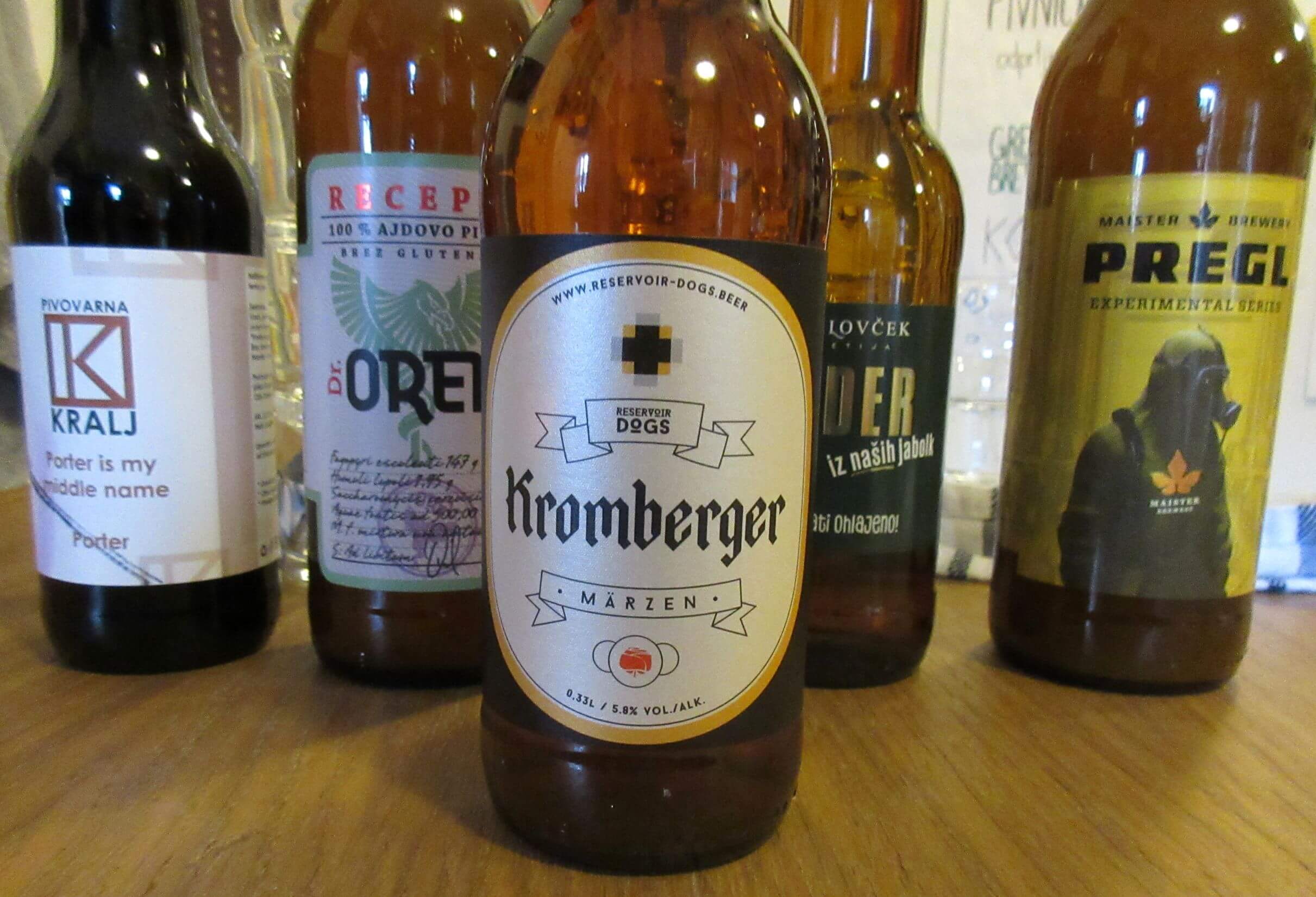
"Pregl is new beer from the experimental range of Kamnik’s Maister Brewery. A very nice sour with passionfruit and mango."
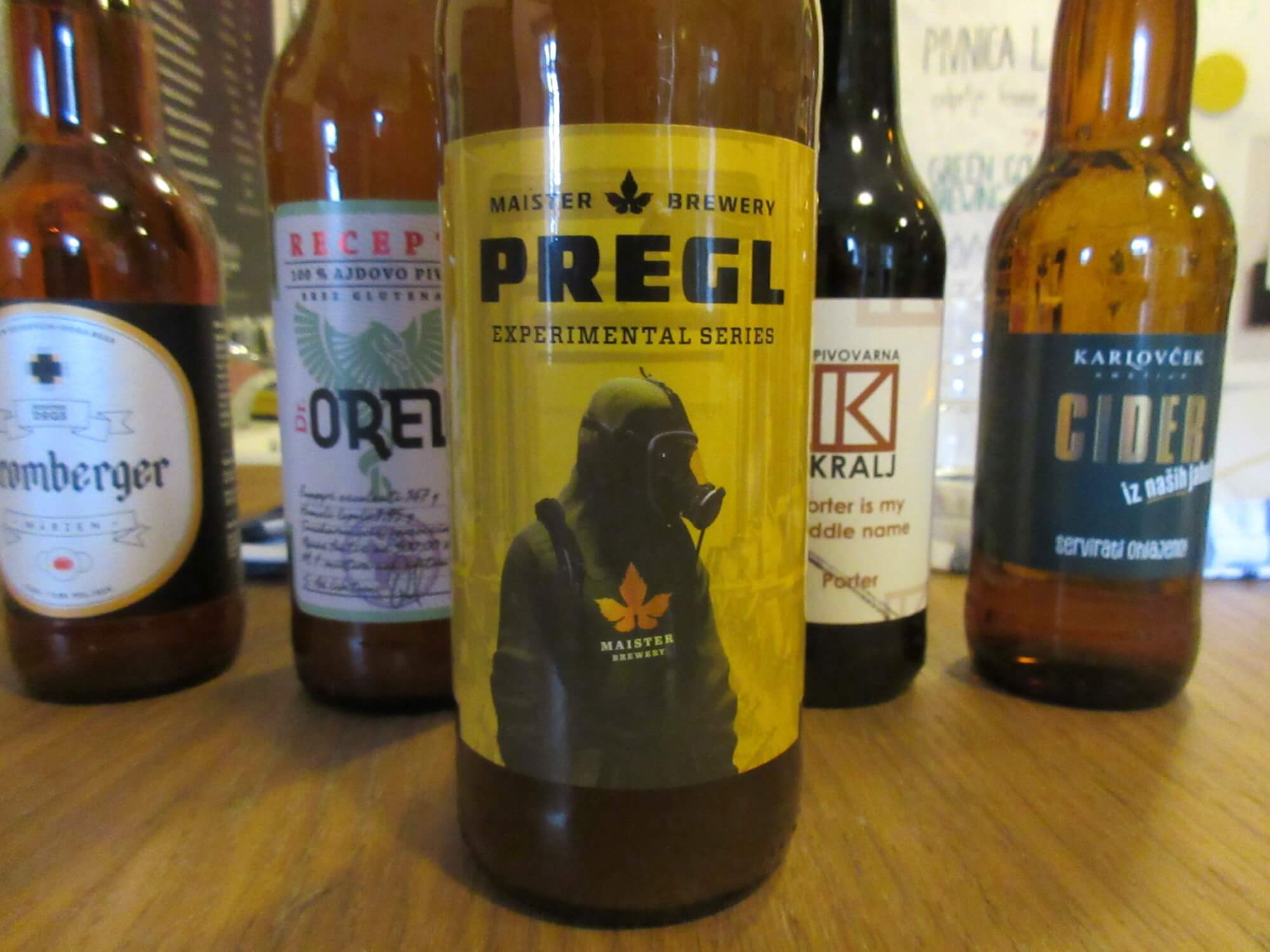
All our stories on craft beer in Slovenia are here
This summer, and until October 13, visitors have been able to experience a very unusual show held in the basement of the Slovenian National Gallery. The exhibition Alan Ford Runs a Victory Lap (Alan Ford teče častni krog) marks 50 years of the Italian comic book named Alan Ford and consists of 162 original boards created by a writer Luciano Secchi – aka Bunker – and artist Roberto Raviola – Magnus – in the years between 1969 and 1975. As the gallery proudly announced, this is the largest exhibition of Alan Ford boards so far, much bigger than the one in Rome which only displayed 30 of such originals.
So how come an Italian comic book has found its way to the Slovenian National Gallery, a place reserved for classic paintings, olds statues and even the original Robba Fountain, that was removed from the Town Square to protect it from rain and other damaging environmental influences?
One of the reasons for this lies in the fact that the comic was much bigger in Yugoslavia than it was in the land of its origin. Not that Alan Ford wasn’t popular in Italy, it’s just that in Yugoslavia it became a cultural phenomenon spread across the entire federation. As Izar Lunaček, a comic book artist commented on Alan Ford in an interview for a national broadcaster, artists from the former Yugoslavia are a bit of fed up with it, since every time they tell someone what they do for a living, the response is always the same, “Oh, I read Alan Ford!”
According to its writer, Bunker, Alan Ford draws on an old art form called commedia dell’arte set in a Cold War situation. The plot consists of a group of anti-Bond characters, who under the official name TNT group run secret government operations from a flower shop in Brooklyn, New York, a cover for their headquarters.
The characters, just like actors of commedia dell’arte, represent fixed social types. To name few of the group’s members:
Alan Ford is a naïve and handsome young man with a troubled love life, drawn to look like the British actor Peter O’Toole.
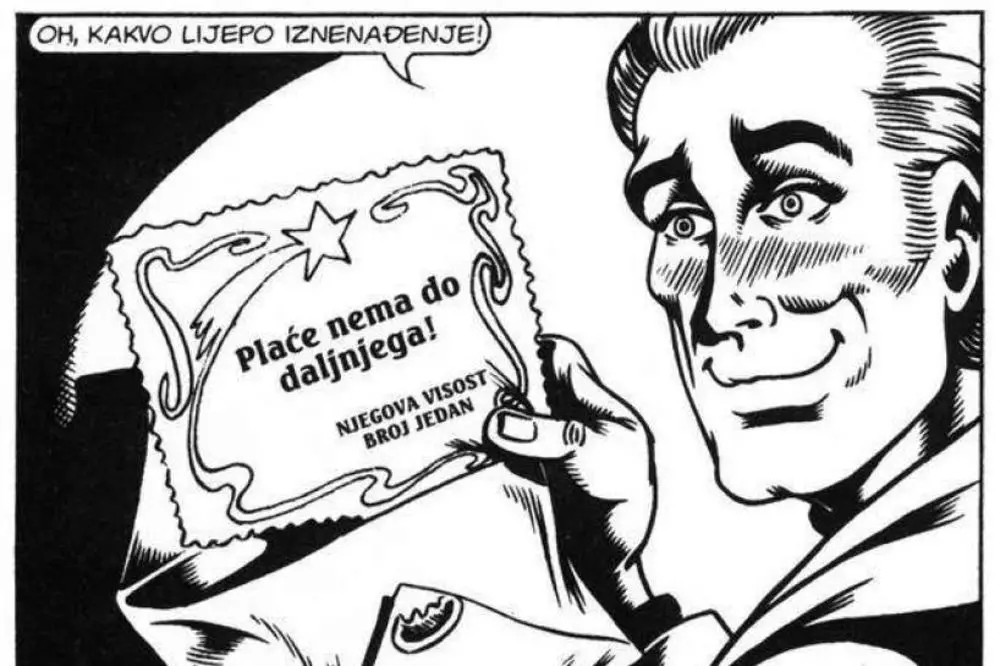
Number One is a cunning old man in a wheelchair, who is in charge of their secret operations. He is in possession a little black book full of compromising information on pretty much everyone, so it seems. He is also very miserly and keeps his agents in a state of constant poverty. He likes to tell them his life story, such as the role he played in Ancient Rome or the American Civil War.
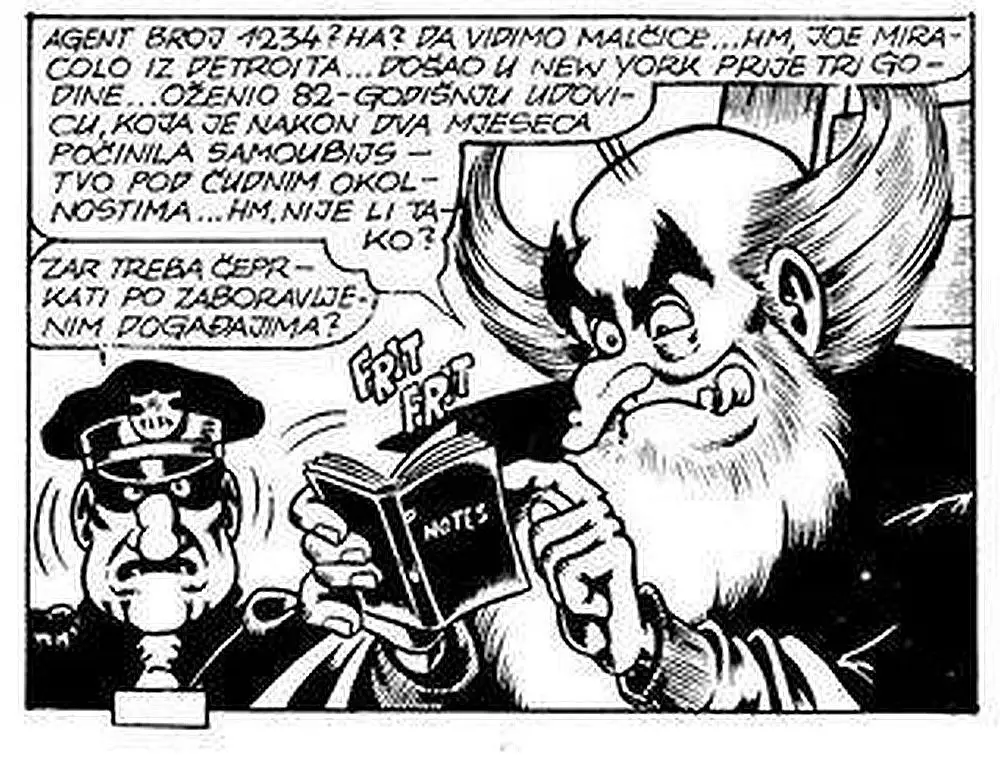
Sir Oliver is an English nobleman and a kleptomaniac, who manages to steal something in every episode, then calls his friend to sell the goods, repeating the line: “Price? A bargain.”
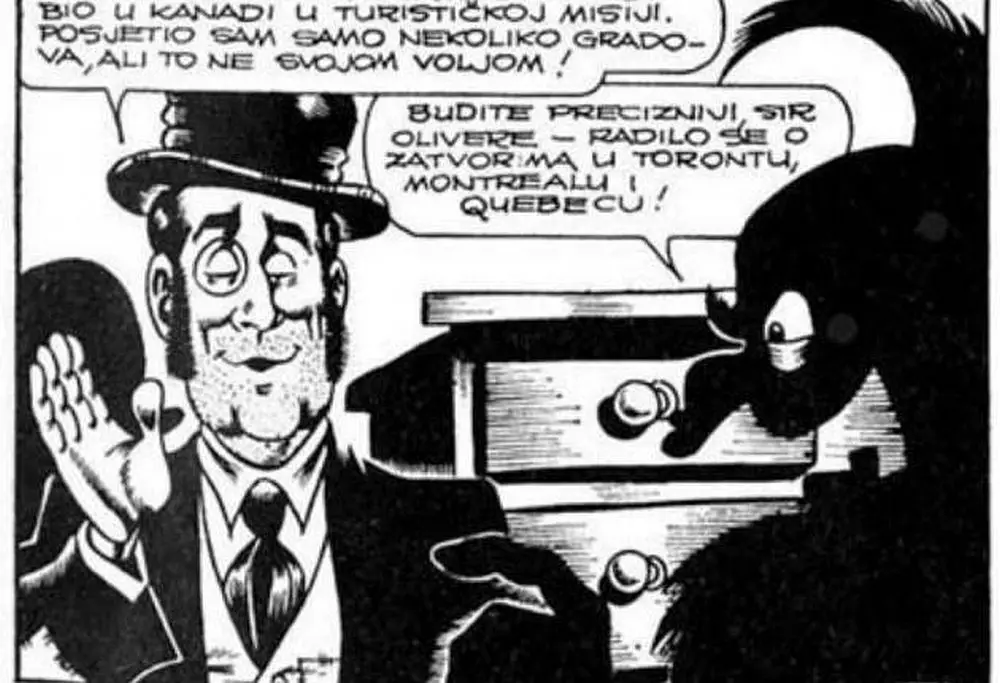
Bob Rock, from a family of criminals, is a very short agent with a quick temper and a large nose, which is the subject of many jokes (which then cause him to lose his temper). Bob Rock is also the most outspoken of the group when complaining about the poor working conditions they have to endure.

This is the decisive moment: better to live one hundred years as a millionaire, than one week in poverty!
Otto von Grunf is a German-born inventor, now a naturalised American, who fought in WWI and, as suggested on many occasions, in WWII as well. A coward full of false bravado he is in charge of the group’s gadget development, although these devices are mostly useless or make little sense.
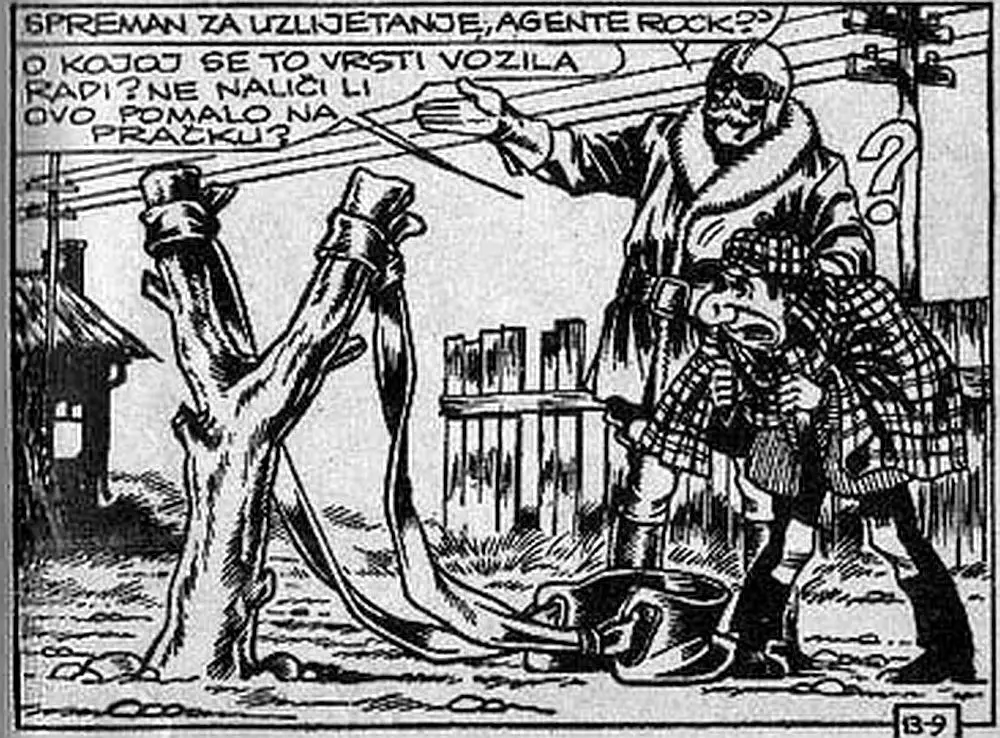
On the side of the villains the one worth mentioning is Superciuk (in Yugoslavia known as Superhik), or Superdrunk, a man who “steals from the poor to give to the rich”, a super anti-hero whose main weapon is his deadly breath, alimented with poor quality Barbera (wine) and onions. In ordinary life, Superhik is a street-sweeper.
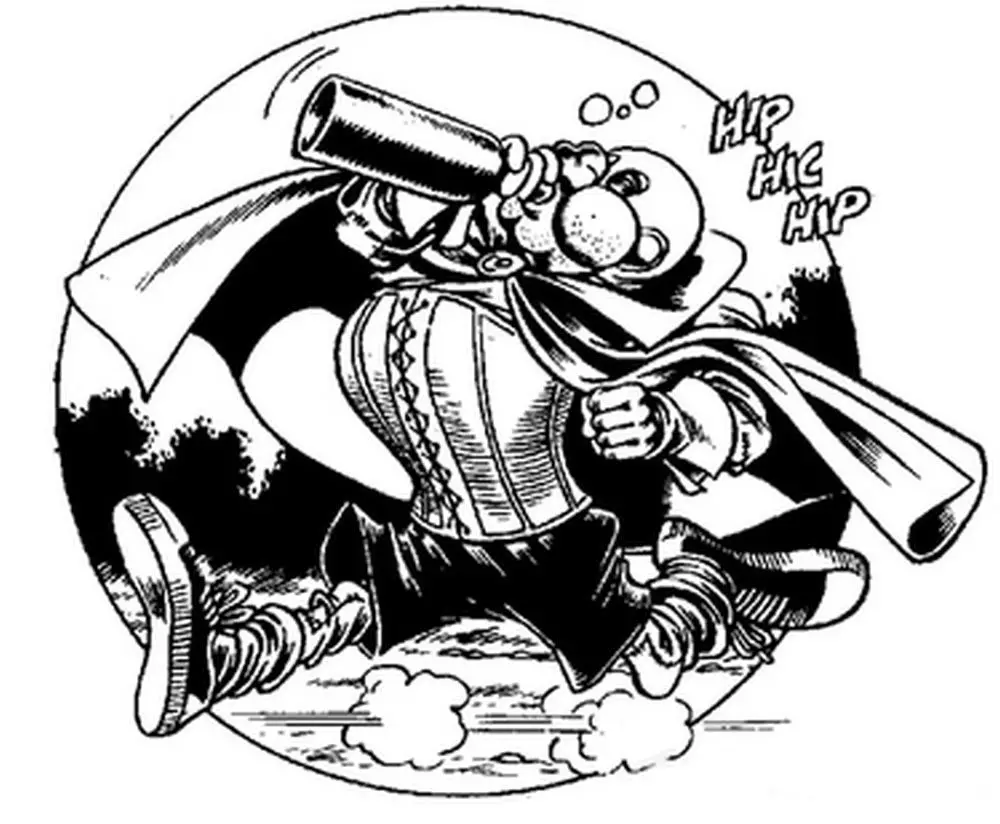
There have been numerous attempts at explanations of why this comic book was so big in Yugoslavia while other translations fared poorly. On reason why the comic didn’t succeed in other countries could certainly be found in the market. It could also be argued that perhaps other translations weren’t as masterfully done as Nenad Brixy’s, under the pseudonym Timothy Toucher. Brixy was also the person mostly responsible for introducing of the comic to the Yugoslav market in 1970, as the man not only found the comic in a shop in Trieste, but translated it into Croatian and as an entertainment editor of Vjesnik secured its publication. When a Slovenian translation emerged in 1993, it was accepted with mixed reviews, some people still continued to prefer the “original” Croatian version.
But this doesn’t explain why Alan Ford gained such a cult status among the Yugoslavs, who en masse identified with the absurdism of the comic.
In part the question was answered by the author, Bunker, himself, who has linked the comic with the tradition of commedia dell’arte.
In this 16th century theatrical form, actors play characters who represent fixed social types and as such improvise on a pre-set plot. Interestingly enough, such improvisation takes much more work than a fully scripted play would, as it involves a lot of practice using various contingency based on reactions from the audience and other actors.
Several scholarly articles have noted that such practice is in fact required from players of every democratic regime. However, “Whereas in English theatre the drama was built around personalities, in commedia dell'arte the characters were subordinate to the plot, as is also the case in democratic politics.”
Commedia dell’arte evades the modern notion of identity as a quest for authenticity in which a “true” self, distorted by a social role-playing, needs to be discovered and exhibited. Instead, role-playing is what constitutes the creation and re-creation of the reality, or “the truth”.
In an interview for the national broadcaster, Marcel Štefančič thus explains: “Why would you have a feeling that all of this was taking place in Yugoslavia? To be a Yugoslavian, that was a role. A Yugoslavian was constantly aware of the fact that they were playing a character. A Yugoslavian was always aware that they were playing a role and they accepted to play that role. They were aware of the gap between their mask, between their acting and the social reality. But they continued to act … These characters in Alan Ford, someone might think, were some sort of Yugoslav dissidents. No way, it was the other way around. A Yugoslavian dissident was certain that behind the mask, there exists some genuine truth. No, these Alan Ford characters lived in no illusion with regard to the fact that even the truth is only a mask.”
Or, to conclude with another quote, from Lazar Džamić, a researcher of the Balkan Alan Ford phenomenon, “Our natural environment, our system of social organisation is not socialism or communism, it is surrealism. This isn’t an art form, it’s what we’ve lived.”
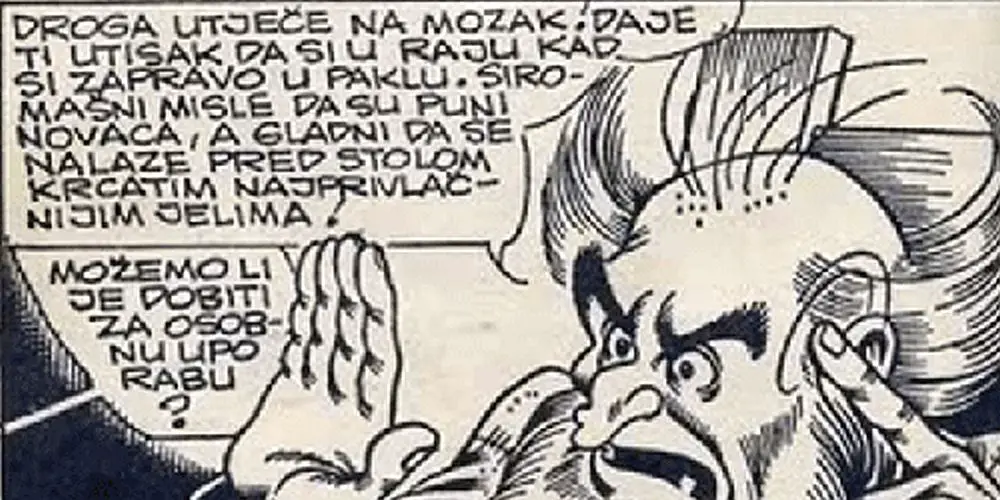
And thus Alan Ford remains, in newsstands, secondhand bookstores and homes across the former Yugoslavia, a window into a world that once was and in many ways continnues to be.
STA, 9 October 2019 - The public health insurance fund ZZZS marked today the 130th anniversary of health insurance in Slovenia. The concept was formally introduced on 1 August 1889 with the launch of the first sickness fund involving compulsory health insurance in Ljubljana.
The local fund was modelled on Bismarck's social insurance for workers, while it was based on legislation issued in the Austro-Hungarian Empire on 6 April 1888.
The solidarity-based fund provided access to healthcare to all workers and their families. The right is enjoyed today by everybody in Slovenia and individual benefits have been expanded, but the basic features were already there in 1889.
The first sickness funds provided workers with a sickness allowance amounting to 60% of their usual pay, however for a maximum of 20 weeks. They were also entitled to a doctor, to medication as well hospital treatment, but for four weeks at the most.
Moreover, women were entitled to 60% of the average pay the first month after giving birth and the purse also paid out a funeral allowance to the family of the deceased amounting to the average pay for 20 days of work.
Addressing the anniversary ceremony, ZZZS director general Marjan Sušelj urged securing the health system's sustainability in the long run, also by increasing state budget finding.
The ZZZS gets 96% of its funds from mandatory health insurance and "when the economy dose worse, there will be less in contributions. Excessive dependence on a single source of contributions poses a major risk," Sušelj told reporters.
He favours abolishing top-up insurance in its current form, although he does not think this will solve the issue of the system's sustainability.
Due to the population's ageing and introduction of new medical technologies, Šušelj believes private funding should be included in the system and the basket of health insurance rights should be reassessed.
Health Minister Aleš Šabeder also noted the need to shift to a financing system that would be more resilient to potential fiscal crises, and to ensure suitable access to health services.
The ceremony was also addressed by parliament Speaker Dejan Židan, who said that universal access to public health services should not be just a catchphrase.
NOTE: This advice was accurate as of 9 October 2019, but may be subject to changE. For the very latest information you can read the GOV.UK Living in Slovenia Guide (http://bit.ly/2W6cwQb) and sign up for updates (http://bit.ly/LiG-SLO-SignUp); and subscribe to British Embassy in Ljubljana's newsletter: (http://bit.ly/UKNinSLO-News)
The British Embassy recently hosted a Q&A on Brexit on its Facebook page, but this is difficult to search and not much of a permanent record. So with the permission of the Embassy and questions edited to remove personal details, here’s what people asked and what the Embassy replied - scroll down for everything or click on the following headings.
Residency / Work / Doing business
Imports, exports, goods and services
Property / Healthcare / Family / Education
Dual nationality / Driving licences / Wills / Child benefit
The ideal soundtrack for this post - a shining disco symphony for the dark days of BrexitResidency
How will becoming a temporary resident be affected by no deal?
You will still be able to apply for temporary residence, set up a business and buy property as a non-EU national. The criteria for doing this is different for EU and non-EU nationals. If you are planning on staying in Slovenia we advise that you register for temporary residency as soon as possible at a local Upravna Enota (Office for Foreigners) and acquire an EU status 5 year temporary residency permit.
With this permit you will be entitled to remain in Slovenia and have the same rights and benefits as an EU national would with a few exceptions such as onward movement (eg relocating to another EU member state). You can then apply to become a permanent resident in Slovenia after 5 continuous years of residency.
If you apply for residency after Brexit then you can still apply for residency on the basis of an EU national within 6 months from Exit day. You would however only receive a 1 year permit. After 1 year you would need to apply as a third country national and there are different criteria for doing this such as being self-employed, pensioner, family reasons or property.
If Britain drops out of the EU on 31 October, what will be the process for permanent residents to ensure they retain their residency status? If a deal is done then what will be the process and will the transition period be 20 months as per the proposed deal or will it be until December 2020 (13 months)?
If the UK leaves the EU without a deal, your residency status will continue until its current expiry. You will need to exchange your current residence permit for a new one, noting that the UK is no longer part of the EU. You must do this within one year of exit day. The UK government would prefer to leave with a deal and it is working in a determined way to get one. Under the current Withdrawal Agreement the Implementation Period will last until 31 December 2020. If a deal is reached, we will further provide information on the process required in that scenario to maintain legal residence in Slovenia.
I currently have temporary residence in Slovenia. Would there be any advantage in switching this to permanent before Brexit?
Ultimately this is a personal choice, but if you have legally lived in Slovenia for a continuous period of 5 years then you may wish to do obtain a permanent residency document. A permanent residence document can be useful when dealing with the authorities or for administrative formalities. To learn how to register as a permanent resident, please visit our Living in Slovenia Guide (www.gov.uk/living-in-slovenia).
In its page on residency and Brexit the EU refers to “EU long-term resident status”, and states:
"This permit will grant you a permanent status, and allow you to enjoy the same treatment as nationals regarding access to employment, education, and core social benefits. This will also allow you, under certain conditions, to acquire the right to reside in another EU Member State."
Does this still apply under no deal, and where can we learn more about applying for this status in Slovenia?
The 'EU long-term residence permit' is equivalent to the permanent residence permit issued to EU nationals in Slovenia. In the event of a no deal Brexit, Slovenia's parliament has passed legislation to enable UK nationals who are permanent residents in Slovenia to maintain most rights enjoyed by EU citizens. Slovenia's no deal legislation can be found through the link below: http://pisrs.si/Pis.web/pregledPredpisa?id=ZAKO8007#
Work
In the event of no deal, will professional qualifications gained in the UK continue to be recognized in Slovenia, and vice versa?
Both the UK and Slovenia will continue to recognize professional qualifications previously accredited before Brexit. The UK and Slovenia will also evaluate applications made before Brexit under pre-exit rules, even if review takes place after Brexit. In the event of a no deal Brexit, we understand that Slovenia will evaluate UK professional qualifications under the rules it currently applies to third country nationals.
Doing business
How will no deal affect setting up a business in Slovenia?
For setting up a business in Slovenia you may wish to contact the British Slovenian Chamber of Commerce who will be able to provide information about doing this as a non-EU national. For more information on this please visit www.bscc.si or the Slovenian Chamber of Commerce at https://eng.gzs.si/.
Imports, exports, goods and services
Can you tell us what will happen to any goods imported from the UK, in the event of no deal? Will goods, even small orders for UK products be subject to additional taxes and duty?
The EU will apply tariffs to UK goods in case of a no deal exit. Details of these tariffs can be found here https://ec.europa.eu/.../import-and.../import-into-eu/
Under the UK’s proposals for a deal, the UK and Ireland will collect their own customs duties according to their respective customs legislation. The vast majority of consignments will be cleared within seconds by HMRC without any documentation of physical checks needed.
In case the UK leaves without a deal, it will continue in this vain with no border checks at Dover. The EU importer will need to liaise with the UK exporter and the electronic paperwork will need to be completed on the UK side. The UK exporter will need to be registered for an Economic Operators Identity. More details are here https://ec.europa.eu/trade/import-and-export-rules/import-into-eu
Please also see the attached handout for businesses (http://bit.ly/2IkLvUE) which outlines the preparations businesses should be making in case the UK leaves the EU without a deal.
How should service providers to / from the UK prepare for Brexit?
If you are a UK service provider in Slovenia you can continue to provide services in Slovenia until the end of your contract (regardless of how the UK exits the EU). After this time you will become a third country national Service provider and will need to check with the relevant regulatory body on continuation of providing services.
Please visit the Slovene Chamber of Commerce website for more details (https://eng.gzs.si/) and the Slovene government website for further information (https://www.gov.si/en/registries/projects/brexit/). You can also use the This email address is being protected from spambots. You need JavaScript enabled to view it. email if you have specific questions about providing services in Slovenia.
If you are a Slovene Service provider in the UK you will be able to continue to provide services and renew your contracts as a third country national once the UK has exited the EU but additional paperwork may be required. Further information on this can be found on www.gov.uk
Property
Will I still be able to buy property in Slovenia?
Regarding the purchase of property as a non-EU national, UK nationals will still fall under OECD rules on property rights and will therefore be able to acquire property in Slovenia under these rules after Brexit.
If No Deal, what effect is it likely to have on those of us who own a holiday home in Slovenia?
Property rights will not be affected by Brexit. If there is a no deal Brexit, UK nationals will be able to visit the Schengen Area for up to 90 days within a 180 day period. If you want to spend more time in Slovenia, you will need to apply for a visa and/or residence. Slovenia has outlined its residency regulations for a no deal Brexit in its no deal contingency regulation, which can be found below: http://www.pisrs.si/Pis.web/pregledPredpisa?id=ZAKO8007.
The Ministry of Interior are happy to answer questions about no deal Brexit and residency, you may wish to contact the relevant unit at This email address is being protected from spambots. You need JavaScript enabled to view it.
Healthcare
What will happen to the EHIC with or without a deal? Is it true that British expats will no longer be entitled to any healthcare in the UK, in the event of a deal or no deal?
If the UK leaves the EU with a deal, you will be able to continue using your EHIC as you do now for the duration of the Implementation Period.
In the event of a no deal Brexit, the UK is seeking in parallel an EU-wide approach or bilateral arrangements with Member States to transitionally continue the current social security coordination rules, including reciprocal healthcare, in full until the end of December 2020. Current reciprocal healthcare arrangements also include EHIC rights. This will protect the rights of individuals who live in, move to, visit or work in the UK or EU until 31 December 2020.
If an agreement is not reached, UK-issued EHICs will no longer be valid in Slovenia. If you are resident in Slovenia, you should seek healthcare coverage through the Health Insurance Institute of Slovenia (ZZZS). To ensure continuity of cover, the UK Government has committed to continue to pay for state-funded healthcare for UKNs currently in Slovenia, for a period of 6 months while you transfer to ZZZS. (http://bit.ly/2o9KmIk).
After the UK leaves the EU, UK insureds will continue to have the right to free NHS care when temporarily visiting England, Scotland and Wales. They will also be eligible for NHS care if they move permanently back to the UK (including Northern Ireland).
What advice would you give to British pensioners on fixed incomes who are unable to afford additional insurance in Slovenia? Will there be funds available to help repatriate them for NHS treatment, if needed?
It is important people think about their own needs and circumstances and look at their options carefully by checking the Living in Slovenia guide, NHS Slovenia country page and speaking to ZZZS.
After the UK leaves the EU, those who have an S1 form will continue to have the right to free NHS care when temporarily visiting England, Scotland and Wales. They will also be eligible for NHS care if they move permanently back to the UK (including Northern Ireland).
In the first 6 months the UK Government has put in place emergency provisions to provide bespoke support to people who find themselves in a challenging healthcare situation (i.e. requiring urgent treatment) due to a change in their healthcare cover after Brexit (http://bit.ly/2o9KmIk).
Family
What will happen to the EEA Family permit in the event of deal or no deal?
Your spouse will be able to visit the UK after 31 October, provided they comply with UK immigration policy. Under the current Withdrawal Agreement nothing will change until the end of the Implementation Period, which will last until 31 December 2020.
If the UK leaves the EU without a deal, it is possible that the EEA Family Permit route to visiting the UK will cease, because the UK national will no longer be an EU national. In this case, your spouse would need to apply for a visit visa (or settlement visa if you plan to stay).
For more information please visit: https://www.gov.uk/settled-status-eu-citizens-families
Will UK citizens who are married to Slovenes be able to move with their families to the UK without conditions, or will there be a minimum earnings threshold?
UK Nationals can return to the UK at any time. Existing close family members of UK Nationals (spouses, civil partners, unmarried partners, children, grandchildren and dependent parents and grandparents) who return from living in the EU by 29 March 2022 can apply to the EU Settlement Scheme.
Future spouses and partners of UK Nationals who return from living in the EU by 31 December 2020 can apply to the EU Settlement Scheme. Dependent relatives of UK Nationals who previously lived in the EU with that family member can apply to the EU Settlement Scheme until 31 December 2020.
After these dates UK Immigration Rules will apply as it does for other UK Nationals returning from abroad.
Will elderly parents of UK citizens who live in Slovenia be able to move here to live with their children, or will there be restrictions?
While the UK remains in the EU, elderly parents of UK nationals resident in Slovenia should be able to live in Slovenia, provided they comply with relevant regulations (depending on whether the parent is an EU national or third country national). In the event of a no deal Brexit, provisions for family reunification are outlined in Slovenia's no deal contingency legislation.
Our understanding of the legislation suggests that close family members are entitled to the same rights as a resident, whatever time they join them, and have permission to reside. You may need to demonstrate sufficient financial resources to support an individual's parents.
Education
My son plans to go to university next year. He has permanent residency in Slovenia and has lived here since he was five years old. He would like to study in The Netherlands. Currently the course fee's for EU students are €2,200 Euro, but €12,000 Euro for a non-EU student. How will he be classed? I was also told that he if goes to the UK, because he has been out of the UK for more than 10 years, he will be classed as an international student there too.
If your son is planning to attend university in the UK next year (academic year 2020/2021) and is either a UK or EU national he will qualify for home fee status for the duration of his course. If your son has lived outside the UK for more than 10 years this should not affect his status if he holds EU citizenship for the duration of his study.
If your son is planning to work in the UK after his studies he may also consider the 'graduate immigration route’. (Available to undergraduates and upwards - primarily aimed at furthering post-grad/work experience for new graduates.) This allows for overseas/EU students to stay and work in the UK at any skill level for 2 years. After the 2 years ex-students will be able to switch onto the skilled work route if they find a relevant job for their skills.
For further information on student finance please visit https://www.gov.uk/student-finance-calculator to find out what your son can qualify for.
In regards to studying in the Netherlands, the Netherlands government have published information here:
https://www.government.nl/.../how-will-brexit-affect...
Should you require more information, please contact British Embassy The Hague:
www.gov.uk/contact-consulate-the-hague
Dual nationality
Is it still possible to apply for Slovenian citizenship and keep my UK passport?
The Slovene Ministry of Interior have confirmed to us that UK nationals are able to apply for dual citizenship while the UK remains part of the EU. Applications lodged prior to Brexit will treat the applicant on the same terms as an EU national, even if the review process takes place after exit.
Will Slovenes still be able to get dual nationality in the UK through marriage (and thus vice versa, since it seems to be reciprocal)?
Dual citizenship is permitted in the UK. The Slovene nationals who are married/in civil partnership with a UK national will be able to obtain UK citizenship if they meet the criteria outlined below: https://www.gov.uk/british-citizenship
I am a dual national of Slovenia and the United Kingdom. Will there be any changes for dual nationals after a possible No deal Brexit?
Your dual national status will not be affected in case the UK leaves the EU without a deal.
Driving licences
The last gov.uk publication on UK driving licence said that Slovenia would accept UK driving licence. You will just require an International Driving Permit for visits over 90 days.
https://www.gov.uk/.../driving-in-the-eu-after-brexit...
You are correct that visitors to Slovenia for 90 days or less will not need an International Driving Permit (IDP). However we advise all Brits living here to read carefully the Slovene government's guidance on driving licences here (http://bit.ly/2u8gNX2).
The Living in Slovenia Guide continues to advise all UK nationals living in Slovenia to exchange their UK driving licence for a Slovene driving licence before the UK leaves the EU (www.gov.uk/living-in-slovenia).
My UK driving licence has the EU flag on it – will I need to change it in the UK before swapping it for a Slovene licence?
As long as it remains valid, UK-issued driving licences will continue to be valid, including those with EU images. You should exchange your UK driving license for a Slovene one if you meet the residency criteria. Residents will be required to do so within 12 months of Brexit. More information can be found on our Living in Slovenia guide (www.gov.uk/living-in-slovenia).
Wills
We have a holiday home in Slovenia. Am I correct in thinking that we need to get our UK will translated into Slovene and a copy deposited with a notary in Slovenia in order for our wishes to be upheld rather than defaulting to Slovene law regarding wills?
You are correct - you do need to translate your will into Slovene and deposit this with a solicitor.
Child benefit
We get child benefit for our two grandchildren who we are raising under a UK special guardianship order. Will this benefit be effected?
Should the UK depart the EU with the Withdrawal Agreement (Deal) your rights as UK nationals in the EU will continue as before and you will have full access to the rights you currently enjoy (e.g. child benefit) for as long as you remain a resident in Slovenia. If the UK departs the EU without a deal then the Slovene government has put in place legislation to protect the rights of UK residents until the end of 2020 when they expect an EU wide agreement to be reached.
If you are a permanent resident your access to Slovene social security benefit should continue as before and you will automatically continue to qualify for child benefit from the Slovene authorities. If you are a temporary resident you will be entitled to the same benefits until expiry of your permit when you will need to either roll over to permanent residence or apply for a temporary residence as a third-country national.
Our current understanding is that the payment mechanism between the UK and Slovenia will remain in place for payment of UK child benefits in all scenarios and are confirming this with our UK tax advisers. We will get back to you as soon as we have confirmation.
The Embassy
Since Brexit, deal or no deal, will be a complex, multi-year process, is the Embassy planning on employing someone to deal full time with the related issues, as well as those that arise if/when the UK finally becomes a third country?
As you may know HMG has allocated a significant number of additional staff to work on the wide variety of Brexit-related issues - both in London and overseas. That includes a number of full-time staff at the Embassy in Ljubljana, as well as additional staff in London and Europe who directly support our work and UK nationals living here.
More questions?
If you have specific questions that are not covered by the Living in Slovenia guide you can contact us via our contact form (www.gov.uk/contact-consulate-ljubljana) or by telephone (01) 200 39 10.
I attended the second edition of the Slovene Cheese Festival 2019 last Tuesday, 1 October, at the Brdo Congress Centre in Kranj. Naturally, I was rather cheese pleased, having had a total of 84 different cheeses laid out before my eyes. For the sake of my belly's contentment, I had to make an effort to not try all that was in sight, as cheese overload is a hard one to digest.
So I went about selecting the most eye-catching and curious cheeses from among 33 enticing cheese displays (each cheesemaker could exhibit as many as three cheeses). The 33 cheesemakers present at the festival consisted mainly of boutique dairies, except for Slovenia's three large producers: Pomurske Mlekarne, Mlekarna Planina, and Mlekarna Celeia.
No Silage
A lot of the boutique cheesemakers that I spoke to emphasised that they don't feed silage to their animals. Silage is a type of fodder produced from green foliage crops that have been preserved by acidification, which is achieved through fermentation. The milk or cheese produced by animals fed on silage is known to have a different taste that is not as pleasant as that produced from animals that feed on pasture.
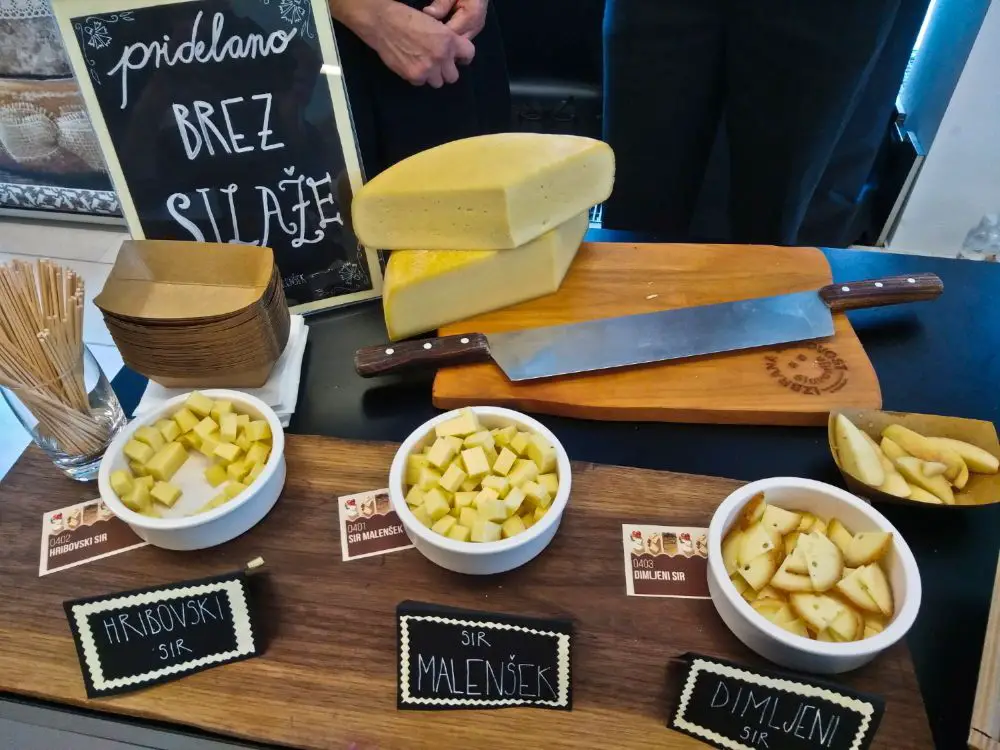
Many boutique cheemakers in Slovenia are proud to say that their animals feed on pasture rather than silage (Photo: Denise Rejec)
Special Cheeses
I tasted a variety of cheeses ranging from fresh to aged, and soft to hard cheeses, some with mould, and others seasoned. Here are some cheeses that really stood out:
- Ekološka Kmetija Planko & Kleh’s fresh goat cheese
- Sirarstvo Orešnik’s eco-ripened soft goat cheese with thyme, and goat and sheep cheese with blue mould which they've named Patricija
- Pustotnik’s Sir Kozovč—a semi-hard cheese made from a mixture of goat and sheep milk
- Kmetija Žerjal's Tropinc—a hard goat cheese immersed in a container filled with Teran grape skins and left there to acquire their aroma and flavour, which is then removed and then aged for one year. I also liked this cheesemaker's Gmajnar—a goat cheese with Karst herbs, and Brin—goat cheese infused with juniper.
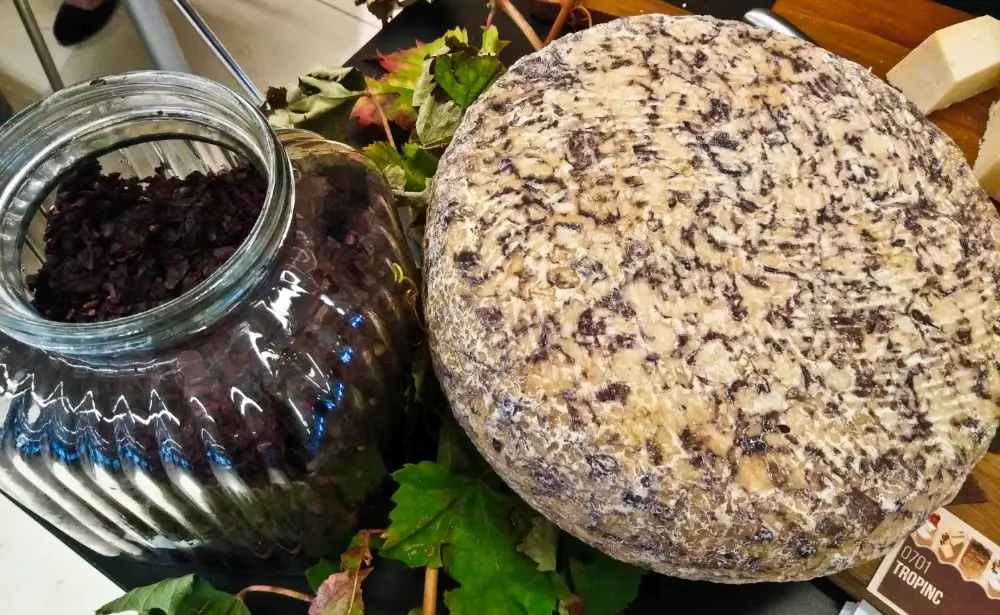
Kmetija Žerjal's Tropinc has a Teran grape aroma and flavour
Cheesey Bites
Chef Jože Godec of Resje restaurant in Bohinj delighted festival-goers with seven different cheese-based finger foods. These included baked potato with the very particular cheese from Bohinj known as Mohant, cheese burgers, ravioli stuffed with skuta, and buckwheat pancake with goat cheese mousse and buckwheat popcorn.
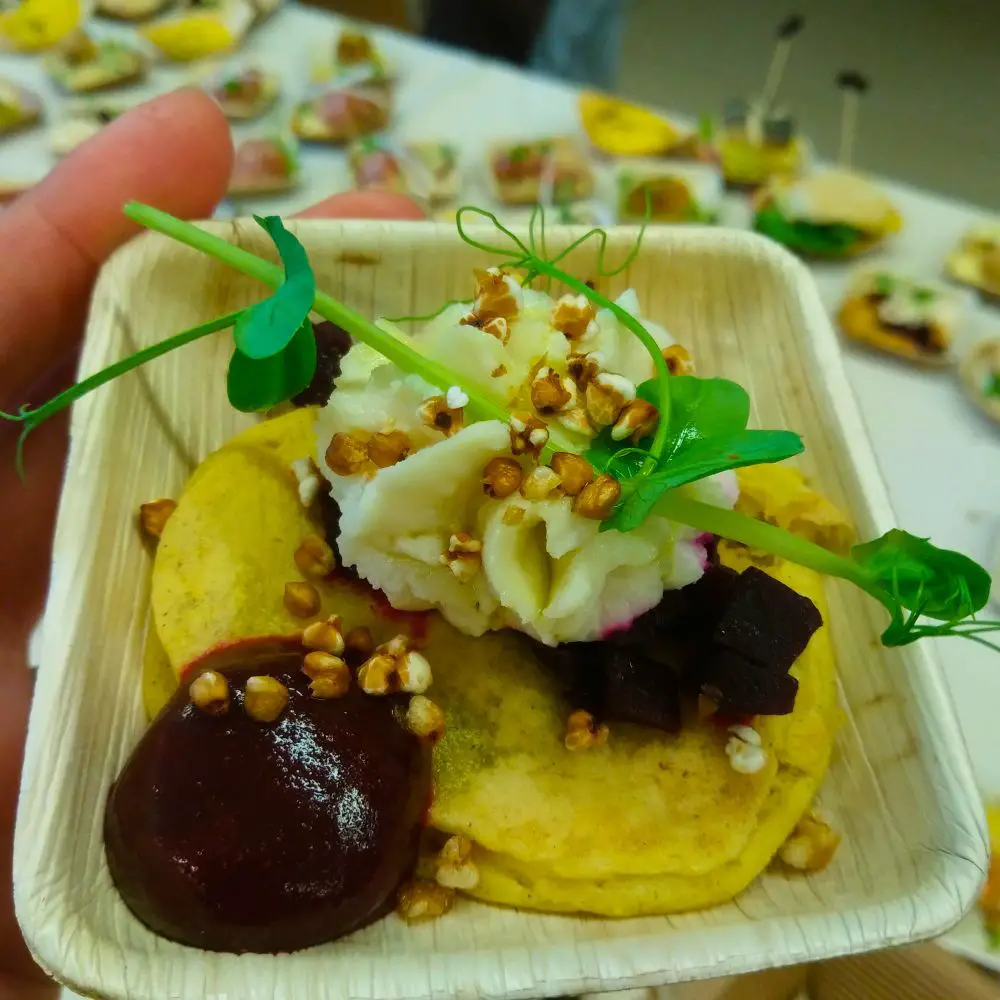
Buckwheat pancake with goat cheese mousse and buckwheat popcorn prepared by Jože Godec of Resje restaurant (Photo: Denise Rejec)
Choco-cheese Bomb
Here's something that I'd never tried before: a cheese and chocolate combo. Kmetija Podpečan had trayfulls of chocolate-covered cheese cubes, some with chilli on top, others with seeds. These proved to be a hit with chocolate and cheese lovers, but I still think I prefer to eat the two separately. In my opinion, chocolate is too good to eat with cheese, and vice versa.
One Success after Another
Last year's Slovene Cheese Festival was the very first of its kind in Slovenia. The Association of Rural Cheesemakers of Slovenia (ZKSS) organised the event to commemorate the 20th anniversary since its inception. Originally, the ZKSS thought up the festival as a one-time event to celebrate the occasion. However, due to last year's success, the association has established it as a yearly event.
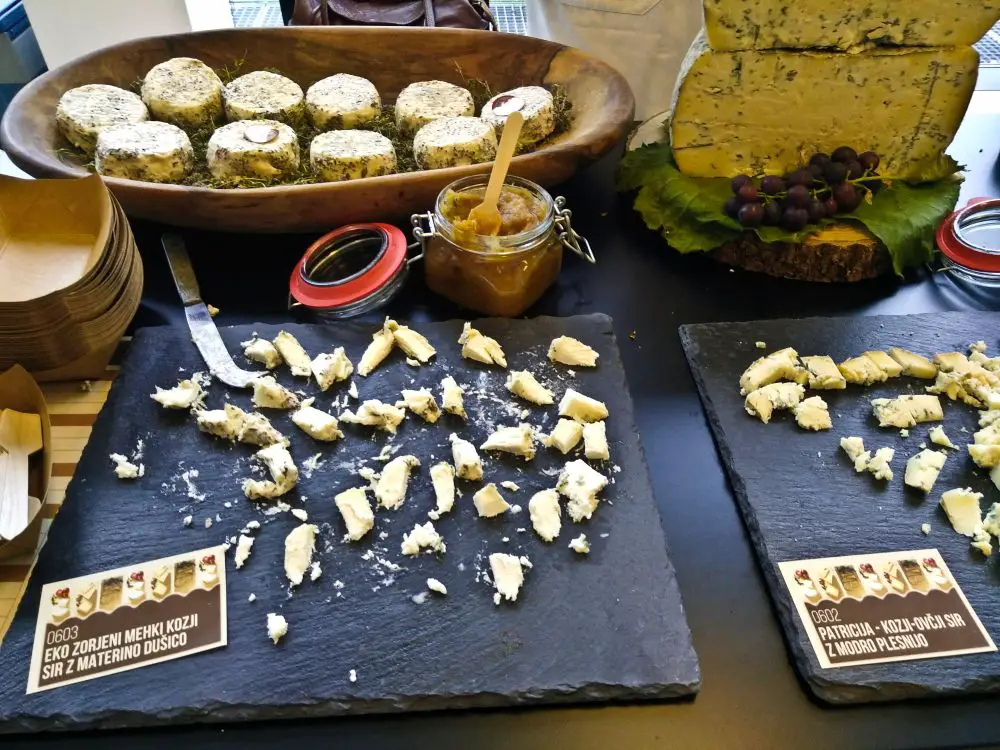
Sirarstvo Orešnik’s eco-ripened soft goat cheese with thyme, and goat and sheep cheese with blue mould (Photo: Denise Rejec)
Strength in Numbers
Some 20 years ago, a group of farmers and dairy producers decided to join forces and form the cheese association (ZKSS). Slovenia back then didn't have the small private cheesemaking dairies that it has today, having only major corporations doing mass production. So cheesemakers felt that they had to come together as an association to develop the cheese aspect of Slovenia's gastronomy.
Since its inception, the association has been based at KGZS – Ptuj Institute. Its 118 members are from all over Slovenia and are active in the field of education, promotion of cheesemaking on farms, and raising the quality of products. The association is an active member of the Farmhouse and Artisan Cheese and Dairy Producer’s European Network (FACE).
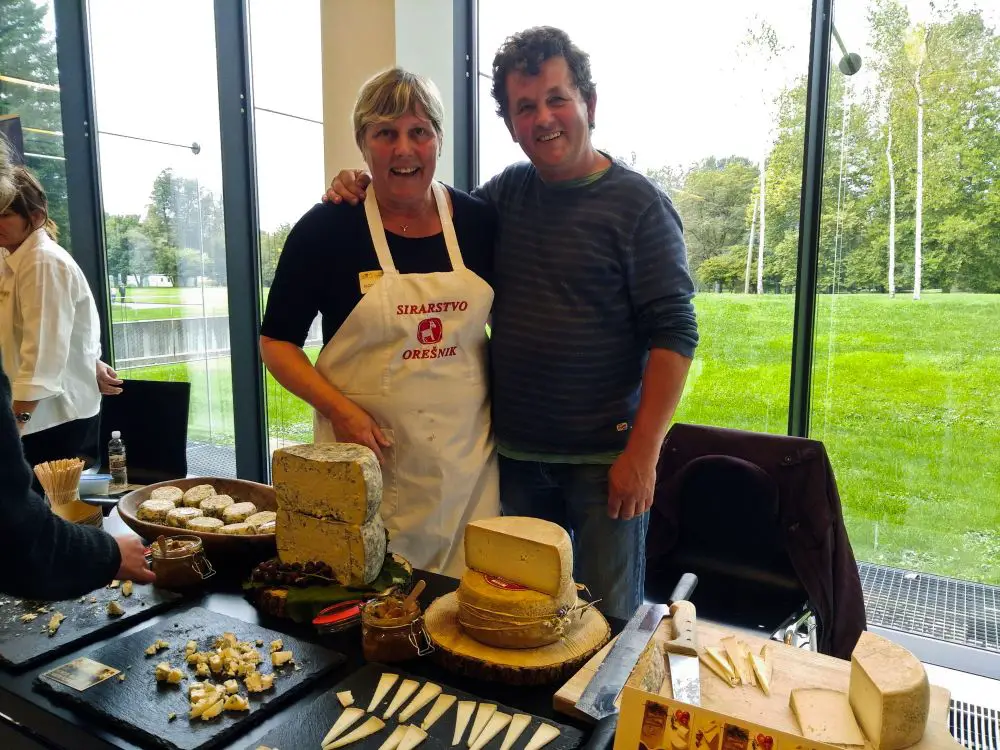
Irena Orešnik (member of the FACE management board) and her husband Dejan of Sirarstvo Orešnik (Photo: Denise Rejec)
Mark Your Diary
The Slovene Cheese Festival is taking place on the same day, every year. So all you cheese lovers out there, be sure to mark October 1, 2020, in your diaries. At the third edition, you will definitely come across a few cheeses that you've never had the opportunity to taste. Till then, all we can say is “More cheese, please!”
You can find a more in-depth feature about the Slovene Cheese Festival 2019 on Wine Dine Slovenia.
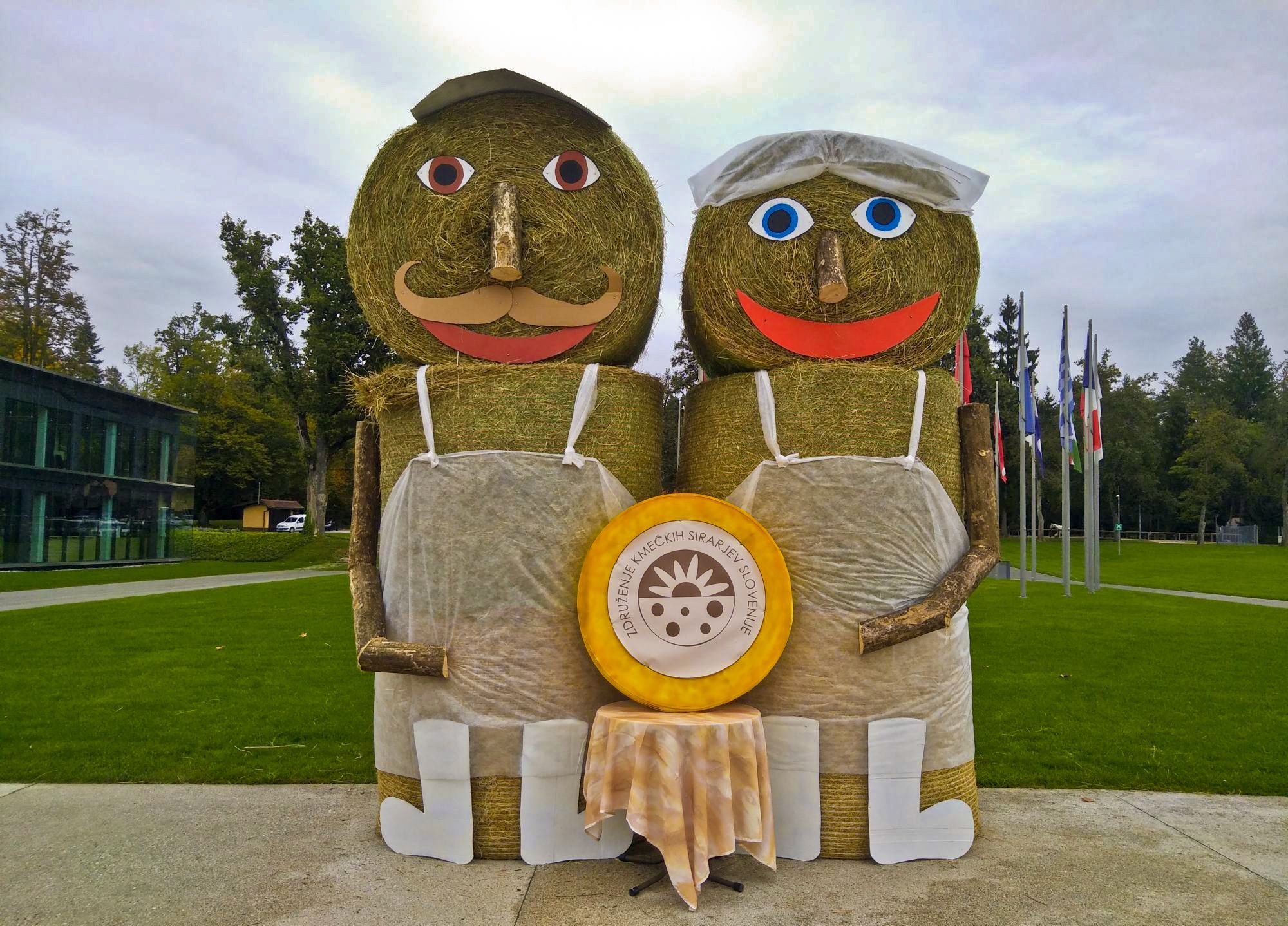
The two Slovene Rural Cheesemakers Association mascots: “See you next year!” (Photo: Denise Rejec)
STA, 8 October 2019 - The Month of Design (Mesec Oblikovanja) event, bringing together around 300 participants from 19 countries in Southeast Europe, got under way in Ljubljana on Tuesday with the Design Expo fair and presentation of a number of awards.
Organised by the Zavod Big centre for creative business, the 17th Month of Design will bring together lecturers and debaters at a number of events on architecture, wood design and creative tourism, among others.
Also to be conferred are awards for product design and fashion, interior design, innovative carpentry and creative tourism, according to the festival's website.
The main event of the festival will be the international exhibition BigSEE, which will feature award-winning projects in four categories in national pavilions set up in Design City in Dunajska Street.
A special Big SEE Visionary Award will go to four "visionaries who have inspired and moved the boundaries of design and architecture with their oeuvre, developing the creative environment of Southeast Europe."
Several awards were already conferred today, including the Design of the Year award, which want to Gigodesign for Bokashi Organko 2, a minimalist kitchen compost bin made from recycled materials, the jury wrote.
Moreover, the Private Interior award went to Dan Adlešič, Gregor Bucika and co. for the Ansambel flat, which counters the trend of hyperaesthetic flat designs by using a more personal touch, and the Public Interior award to Nuša Jelenec for the pizzeria Trappa project that experiments with new spacial relations, materials, textures and colours.
Also conferred was the Timeless award, going to glass designer Tihomir Tomić for a glass coffee cup which he designed in 1980 and which was produced in a limited edition by the Steklarna Boris Kidrič glassworks in v Rogaška Slatina.
The jury wrote that the relatively long glass-working tradition in Slovenia had attracted various artists who primarily worked in other fields. Tomić, a graphic designer by training, worked at Steklarna Boris Kidrič and created a number of daily use products, decorative items and glass sculptures, many of which unfortunately remained limited to a test edition.
The coffee cup, made from hand-blown glass in a translucent and etched version combines pure form and experiment - etching with acid - along with an excellent and precise execution. Simple, essential, timeless, the jury wrote.
Design City also hosted today a design conference featuring presentations of award-winning projects and of successful companies promoting progress empowered by design.
The Month of Design will run until 8 November, featuring another 60 partner events all around the Slovenian capital.
STA, 6 October 2019 - Retired Celje Bishop Stanislav Lipovšek stressed at the annual Teharje ceremony remembering an estimated 5,000 victims of war and post-war summary executions the need "for true reconciliation with the past" if Slovenia wants to build a safe and happy future.
Addressing the ceremony in the Teharje Memorial Park (Spominski park Teharje) near Celje on Sunday, Lipovšek said 74 years were passing this year since the end of World War 2, 50 of which passed in forced silence and an guided concealing of the truth about events during and following the war.
While speaking of 600 execution sites around the country as proof of that, Lipovšek expressed gratitude to all who made sure that these sites are finally being tended to and that Slovenia is approaching the basic civilisational norm of giving the dead the right to a name and a grave and the living the right to remember.
Mass Graves in Slovenia: An interactive map
"For a lasting an true peace and a future of our nation, a reconciliation of with the past is vital, since we cannot build a safe and happy present time and future without making sure true reconciliation with the past occurs.
"Reconciliation is only possible if we're willing to forgive. And forgiveness is only possible when we're ready to admit the truth, no matter how painful, difficult and burdensome it may be. Only the truth sets you free," Lipovšek said.
The ceremony was also addressed by researcher Slavko Žižek, who said "no nation can survive with a burden that began with the murder of several hundred victims in the autumn of 1941 and spring of 1942 and ended with the executions of thousands at the end of the war".
He rejected the continuing accusations of treason, collaboration etc, saying that the "only sin of these people was to resist the terror of the red star".
Many had to leave Slovenia because of their "love of God, of the nation, homeland and life" and they managed to preserve the Slovenian language and love of the homeland and transfer them to their offspring, which "simply does not square with the definition of treason", he said.
Among the victims the Teharje Memorial Park pays respects to were members of the Home Guard, a militia that collaborated with the Nazis; soldiers; civilians; and refugees from Croatia and Serbia apprehended by the Allies in May 1945 in the northern Koroško region as they were fleeing north.
Book: Post-War Massacres in Slovenia
The Allies turned them over to the Partisans, who brought them to the Teharje barracks, a facility formerly used by the Nazi Germany military.
In the subsequent two months, some 5,000 people were killed without a trial on several locations nearby Teharje, including the notorious Huda Jama mine shaft near Laško.
It took a long time until the locals dared to speak about what had happened. Many mustered the courage to speak up only after Slovenia gained independence in the early 1990s.
A memorial park was inaugurated at the site of the former barracks in 2004 but it still not fully finished.
Keep up with the daily news in Slovenia by checking the morning headlines here
The follow schedule was prepared by the STA:
MONDAY, 7 October
LJUBLJANA - The National Assembly will convene a special session at which the government will present budget documents for 2020 and 2021 before debate starts at the level of committees.
LJUBLJANA - The parliamentary inquiry into alleged abuse at the Bank Assets Management Company will interview several officials as witnesses.
LJUBLJANA - A Slovenia-Jordan business forum will be held as part of a visit by a 22-strong Jordanian business delegation.
LJUBLJANA - The women's section of the Slovenian PEN centre will give out the Mira Prize.
TUESDAY, 8 October
LJUBLJANA - Prime Minister Marjan Šarec will join a session of the Economic and Social Council in a bid to restore social dialogue.
LJUBLJANA - The parliamentary Finance Committee will debate amendments to the property appraisal act, amendments to the fiscal balance act, and a bill on Swiss franc loans.
LJUBLJANA - The parliamentary Justice Committee will debate amendments to the integrity and prevention of corruption act.
HALOZE - The Slovenian Rural Parliament will start a two-day session at which 250 participants from Slovenia and other EU countries will debate challenges of farming and the countryside.
LJUBLJANA - The Month of Design will get under way with Design Expo, until 8 Nov.
WEDNESDAY, 9 October
LJUBLJANA - Dutch Foreign Minister Stef Blok will pay a visit to Slovenia.
MARIBOR - A ceremony will be held as a new rotation of Slovenian troops leaves for Kosovo to serve in the international K-for mission there.
GENEVA, Switzerland - Day of Slovenian Industry at the headquarters of the European Organization for Nuclear Research (CERN).
LJUBLJANA - The parliamentary Privileges and Credentials Commission will debate amendments to the deputies act.
LJUBLJANA - A ceremony will mark the 130th anniversary of health insurance in Slovenia.
THURSDAY, 10 October
SKOPJE, North Macedonia - Prime Minister Marjan Šarec will meet his counterpart Zoran Zaev and Speaker Talat Xhaferi on his first visit to North Macedonia.
CELJE - An international conference on inclusion of Roma and migrants in schools.
LJUBLJANA - The Statistics Office will release foreign trade and industrial output data for August.
PORTOROŽ - A ceremony will mark the 50th anniversary of the Marine Biology Station Piran.
LJUBLJANA - A new production of Mozart's opera The Magic Flute will open at SNG Opera Ljubljana.
SKOPJE, North Macedonia - Slovenia will take on North Macedonia in the qualifying for for the UEFA Euro 2020.
FRIDAY, 11 October
ATHENS, Greece - President Borut Pahor will take part in a two-day meeting with the heads of state of 12 other EU countries as part of the initiative dubbed the Arraiolos meeting. He will also take part in the Athens Democracy Forum organised by the New York Times.
LJUBLJANA - The parliamentary Finance Committee will debate the impact of Adria Airways's privatisation at the request of the opposition Left.
LJUBLJANA - MEPs Irena Joveva, Milan Zver, Milan Brglez and Ljudmila Novak will meet representatives of youth organisations at EU House.
LJUBLJANA - An exhibition will open on Miroslav Cerar, a two-time Olympic gymnastics champion, on his 80th birthday.
SATURDAY, 12 October
GORNJA RADGONA - A ceremony will mark the 50th anniversary of the bridge linking Gornja Radgona in Slovenia and Bad Radkersburg in Austria, to be attended by Foreign Minister Miro Cerar and Governor of the Austrian State of Styria Hermann Schützenhöfer.
SUNDAY, 13 October
LJUBLJANA - European Art Cinema Day will be held in more than 700 cinemas in 39 countries, including Slovenia.
LJUBLJANA - Slovenia will play Austria in the qualifications for the UEFA Euro 2020.




